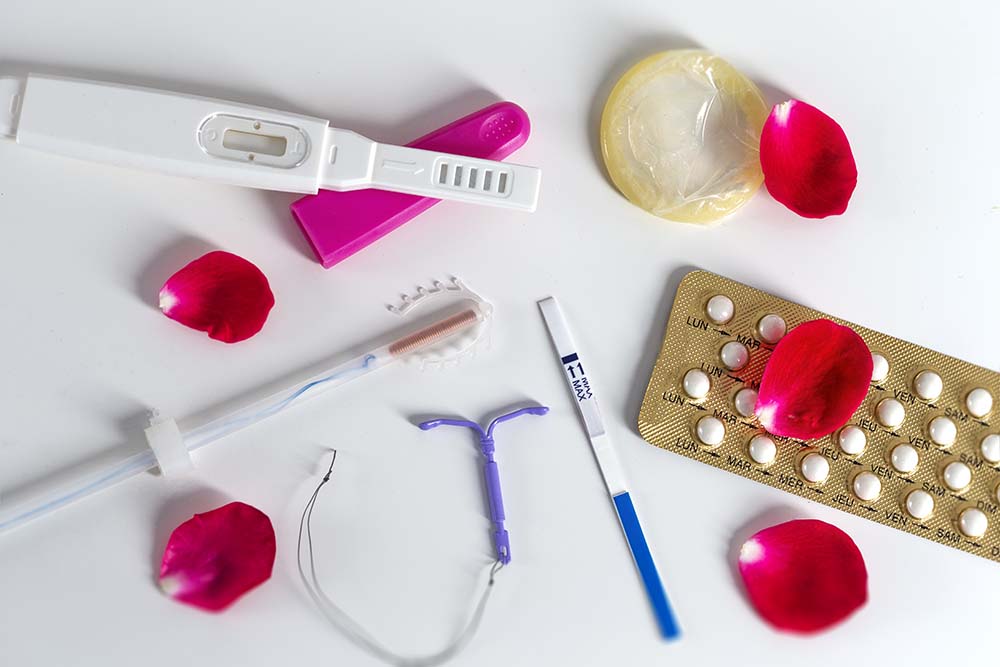What is birth control? Simply put, birth control is a way to prevent pregnancy. Whether you’re just married and want to postpone having kids, or whether you’re done with childbirth for good… there are various methods of birth control that you can explore.
Natural, Non-Invasive Methods
“There are several non-invasive ways of birth control, where no medication or external tool is involved,” says Dr Asha Kurien, Bengaluru-based gynaecologist and obstetrician. “One way is outercourse, where activities other than penetrative vaginal sex are practised. Another popular method is withdrawal. However, this is not totally foolproof if there are accidents and lapses! Also, both outercourse and withdrawal don’t protect against STDs, so you’ve got to take precautions. Lastly, breastfeeding mothers – who are actively feeding at a minimum of four-hour intervals – generally don’t ovulate. This means no period and no pregnancy either.”
Barrier Methods
“Condoms are the most common barrier contraception method,” adds Dr Kurien. “Along with preventing pregnancies, condoms also prevent STDs.” According to her, spermicidal agents are also gaining popularity. These are chemicals in the form of creams, gels, foams or tablets, but frequent use should be avoided. “Consider using a diaphragm or cervical cap,”
Long-term Methods
“The use of an IUD or Intrauterine Device is popular with women as it is long-term, reversible and effective,” says Dr Kurien. “This small T-shaped piece is inserted into your uterus. This could be a copper IUD, where a copper wire is wrapped around the frame, also called Copper T. It could also be a progesterone-carrying IUD that releases 65 mcg of hormone every day. The hormone released forms a thick plug of mucus, preventing penetration by the sperm. They’re easily removable, and you can get pregnant within a few months of taking them out. 75 per cent conceive within 6 months, and 90 per cent within a year. However, the procedure does require medical or paramedical intervention. Be watchful of a displaced IUD and fix it when required. Also, check with your doctor before you decide to get one – if you have fibroids, diabetes or anaemia, for instance, it is advisable to avoid this method.”

The Pill
When you refer to ‘the pill’, you don’t need to specify what kind! The ubiquitous name for oral contraceptives, these are affordable, safe and effective. “Essentially, the hormones in the pill affect ovulation and thicken the cervical mucus, blocking sperm so it can’t reach the egg,” says fertility expert and IVF practitioner Dr Jayanthi Suresh. “Tablets should be taken starting from the first day of the menstrual cycle for a period of 21 days. A new course should be started after a seven-day gap. During the first cycle, an additional birth control method is recommended. If a woman forgets her tablet, she can take 2 tablets the following day. She is no longer adequately protected if she forgets to take it more than once in a cycle. The pill is also used to treat PCOD and endometriosis in some cases. There might be spotting during the first three months, along with headaches, migraines, depression, irritability, weight gain, lethargy and mood swings are other side effects. Take it only in the recommended doses by your doctor, especially if you have other underlying issues like cardiac disease, hypertension, anaemia, migraines, or obesity. Lactating women should avoid it too.”
The good news is that 99 per cent of women will have normal menstrual cycles within 6 months of stopping oral contraceptives, but the return of fertility maybe delayed due to delayed return of ovulation. It is not recommended that you take the pill for longer than a year, to avoid health and fertility complications.
Surgical Sterilisation
You can opt for either tubal ligation (permanently closing or cutting your fallopian tubes) or bilateral salpingectomy (removing fallopian tubes entirely). Pregnancy is no longer a possibility when the passage doesn’t exist. This is permanent – so get sterilised only if you’re sure there’s no going back and you don’t want children ever. However, it won’t protect you from STDs.
According to a report by the Ministry of Health & Family Welfare, India is the only country to have received an award for ‘Excellence in Leadership in Family Planning’ (EXCELL) in the ‘country’ category at the International Conference on Family Planning in 2022. The report further stated, “India has made outstanding progress not only in improving access but also adoption of modern contraceptive methods enabling couples to make informed choices about family planning. These are reflected in the National Family Health Survey (NFHS) – 5 data. As per NFHS-5 data, overall Contraceptive Prevalence Rate (CPR) has increased substantially from 54 per cent to 67 per cent in the country, from NFHS-4. Similarly, unmet needs of family planning have witnessed a significant decline from 13 per cent to 9 per cent. The unmet need for spacing has also come down to less than 10 per cent. The government’s focus on improving easy and affordable access to modern contraceptives is reflected in the fact that 68 per cent of modern method contraceptive users obtain their method from the public health sector, as per NFHS-5 data. Mission Parivar Vikas, one of the government’s flagship programmes, to reduce unmet needs in family planning, has also been a critical factor in the overall improvement.”
We advise you to consult a medical expert for advice and guidance on the contraception that is best suited for you.